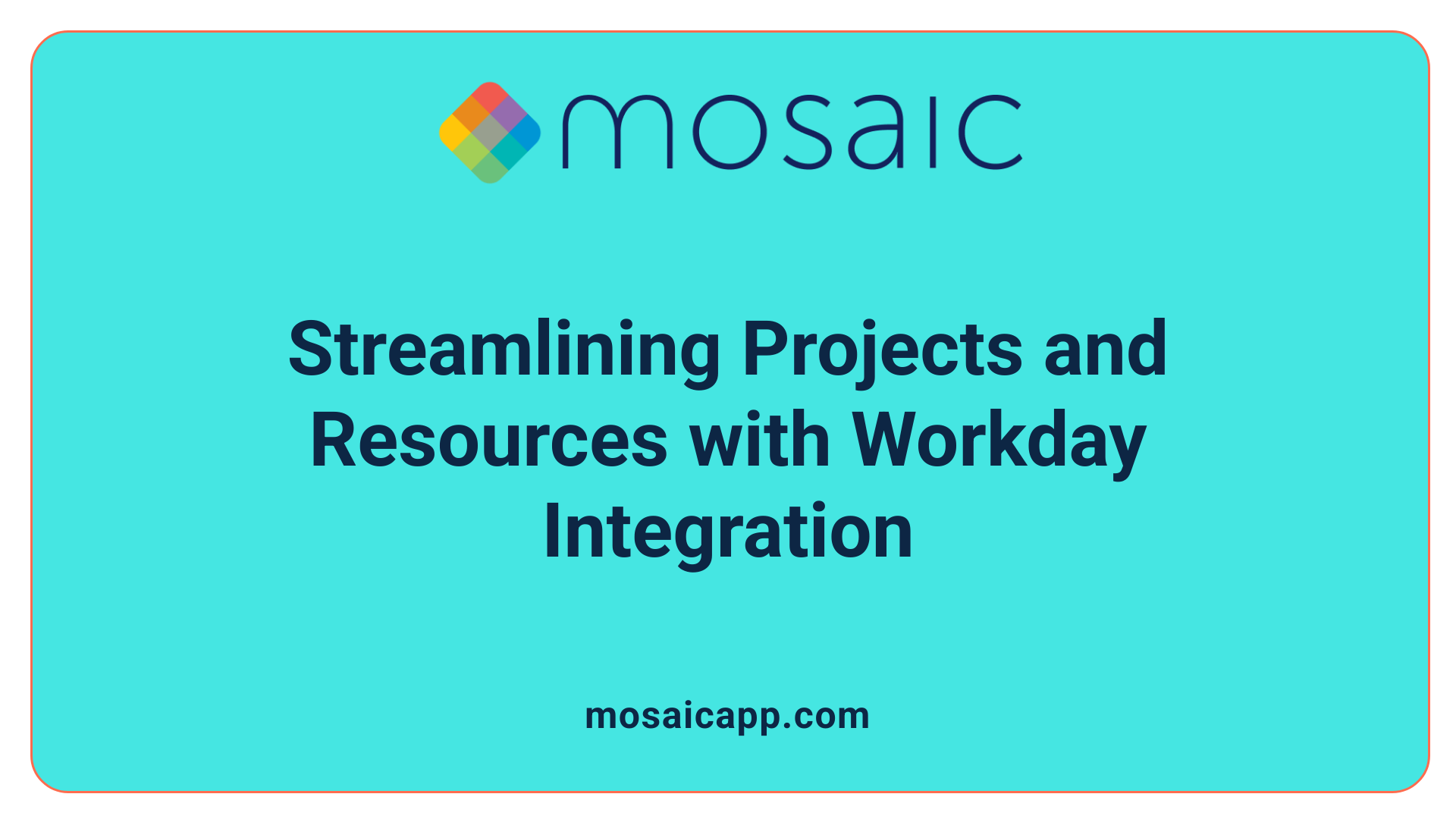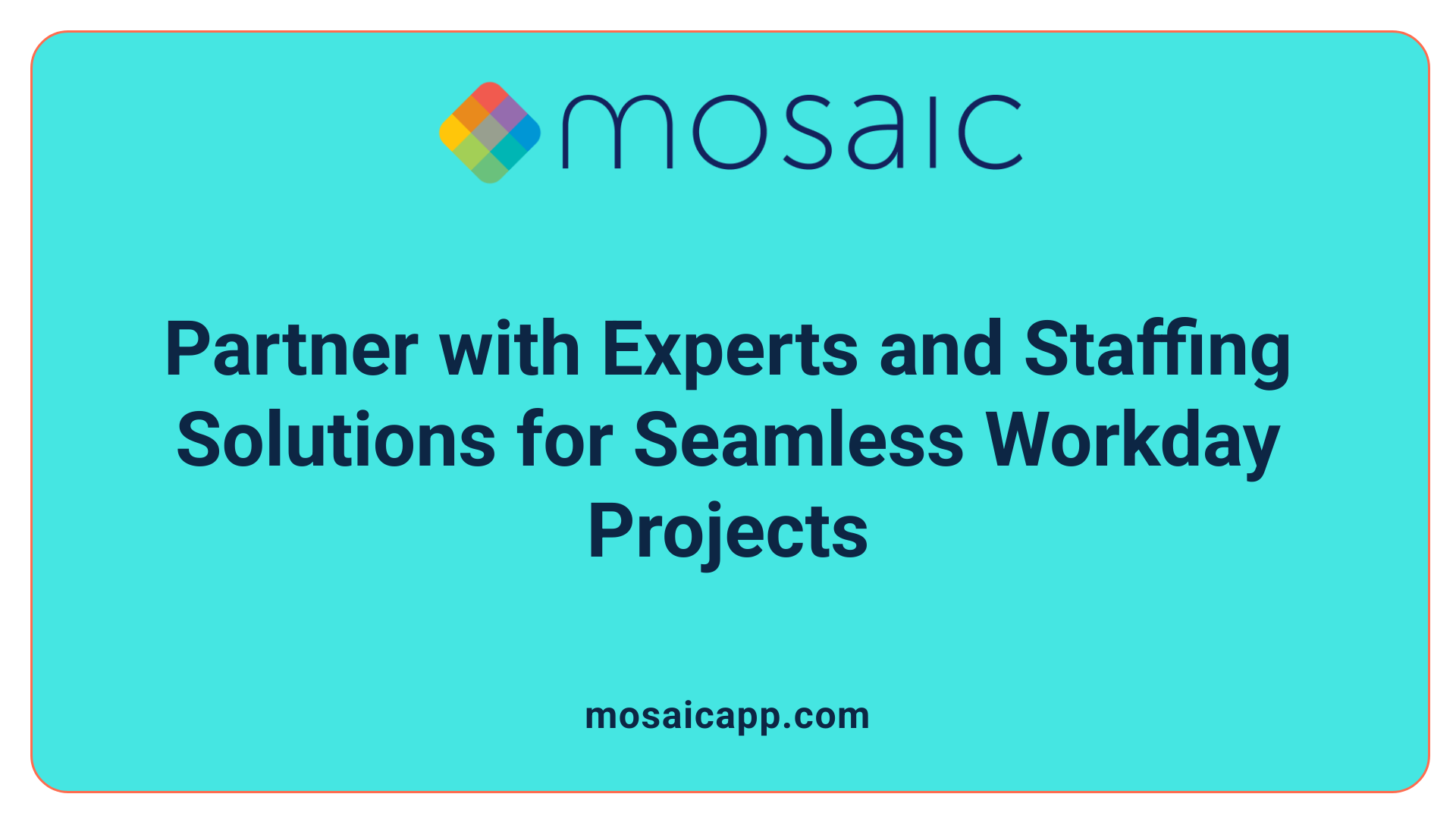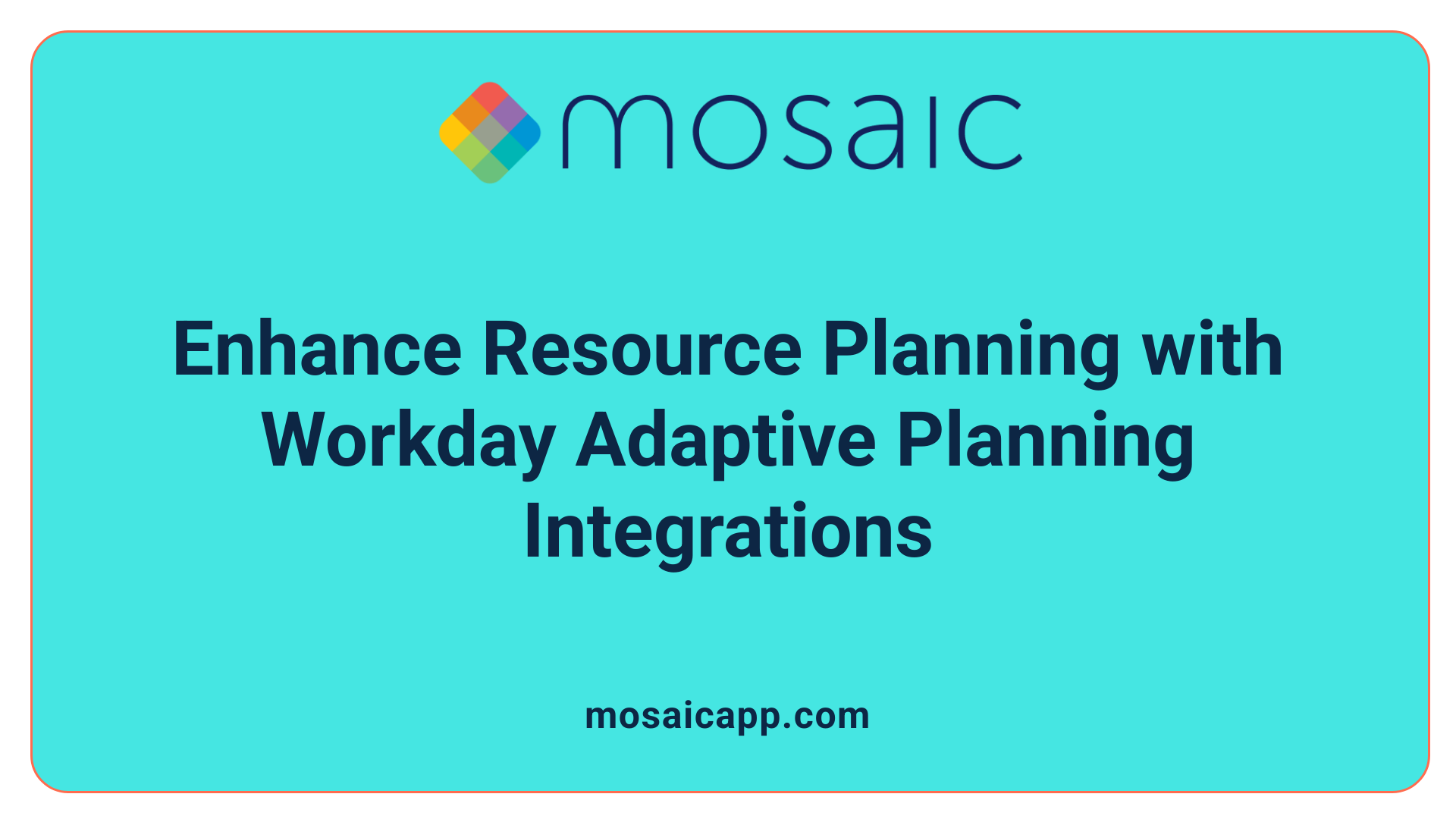Understanding the Synergy Between Workday and Resource Planning
In today's complex business environments, successful project delivery requires unified systems that integrate work management with resource planning. Workday's comprehensive platform brings together Human Capital Management, Financial Management, and Spend Management, enabling enterprises to connect project goals with resource availability efficiently. This article explores how Workday facilitates this integration and how a systematic resource planning approach ensures optimal project outcomes.
Workday's Integrated Approach to Project and Resource Management

How does Workday integrate project management with other enterprise functions?
Workday Project and Work Management seamlessly integrates with core enterprise systems such as Workday Human Capital Management (HCM), Financial Management, and Spend Management. This integration creates a unified platform that supports comprehensive project and resource planning across the entire organization. By connecting these systems, Workday enables smoother workflows, better data sharing, and consistent management of projects from human resources to finances.
What capabilities does Workday provide for project and resource planning?
The platform supports modeling various types of work, whether simple or complex. Users can establish budgets and design detailed project plans that include phases, tasks, and milestones. For resource planning, Workday leverages worker profile data from HCM—such as skills, experience, and talent pools—to align staffing accurately with project needs. This in-depth resource alignment allows for better utilization of existing talent and efficient sourcing for required roles.
How are project performance and resource utilization monitored?
Workday offers dynamic dashboards and notification features that provide real-time insights into project progress. Managers can track labor hours, expenses, procurement costs, and overall adherence to budgets. These tools enable assessment of project quality and status, facilitating timely interventions when necessary. By linking project goals with resource management, Workday increases visibility into workflows and enhances organizational efficiency. This approach ensures that performance and rewards are connected directly to project outcomes and resource contributions.
Constructing a Comprehensive Workday Resource Plan

What is a Workday resource plan and why is it important?
A Workday resource plan is essentially a detailed document that outlines the roles, responsibilities, and the number of hours required for each phase of a Workday implementation project. This plan is crucial because it ensures that the project is staffed appropriately, aligning resources with the specific demands of the project phases. By having this detailed mapping, organizations can maintain smoother transitions and sustain continuous operations during and after the implementation.
What key resource areas should be included in the plan?
When developing a Workday resource plan, certain resource areas must be accounted for to cover the multifaceted nature of such a project. These areas include:
- Legacy system management: Handling data and processes from existing systems.
- Functional and operational support: Ensuring daily functionality and supporting operational requirements.
- Project management: Overseeing project timelines, budgets, and deliverables.
- Integrations and data management: Managing connections between Workday and other enterprise systems.
- Change management and training: Preparing the organization and users for new processes.
- Post-implementation support and optimization: Providing ongoing system support and performance improvements.
How should organizations develop a resource plan effectively?
To develop an effective resource plan, organizations should start by assessing the full scope of the project. This involves identifying the necessary roles and required skill sets for various stages. An audit of current internal resources helps pinpoint existing capabilities and gaps, which must be addressed to avoid delays or inefficiencies.
The process continues by highlighting skill and resource gaps that may require additional recruitment or training. Preparing contingency plans is also necessary to mitigate any unforeseen challenges during implementation. Inclusion of input from internal teams as well as system integrators like Workday Professional Services or certified Implementers enriches the plan with valuable expertise.
Partnering with staffing specialists can support filling critical gaps by providing trained project managers, analysts, and architects experienced in Workday projects. This structured approach helps maximize resource utilization, reduce risks, and promote a successful implementation journey.
Leveraging Partner Support and Staffing Solutions

Who are important partners in a Workday implementation resource plan?
Key partners in a Workday implementation resource plan include system integrators such as Workday Professional Services and certified Implementers. These specialists bring essential expertise in establishing realistic and comprehensive resource plans. Additionally, staffing firms like Healthcare IT Leaders contribute by filling any resource gaps with qualified professionals.
Benefits of involving Workday Professional Services and certified implementers
Workday Professional Services and certified Implementers offer deep knowledge of best practices, project specifics, and technical requirements. Their involvement helps to ensure accurate estimates, optimal allocation of internal and external resources, and a smoother implementation process.
Addressing resource gaps through staffing firms
Staffing firms effectively address skill shortages by providing trained project managers, analysts, and architects on demand. This approach reduces the risks related to insufficient or unavailable internal resources and supports continuous progress without compromising project quality.
Professional profiles like project managers, analysts, and architects availability
Through partnerships, organizations gain access to experienced professionals who specialize in managing complex Workday projects. Project managers oversee timelines and deliverables, analysts handle data and requirements analysis, and architects focus on system integrations and technical design.
Ensuring a seamless resource supply for project success
Combining system integrator expertise with staffing firms’ flexible workforce solutions creates a comprehensive resource strategy. This collaboration ensures that all critical roles are filled as needed, enabling a successful Workday implementation that stays on scope and schedule.
Automating and Enhancing Resource Planning Through Workday Adaptive Planning Integrations

How does Workday Adaptive Planning facilitate data integration?
Workday Adaptive Planning offers comprehensive integration options to connect with a variety of enterprise systems. It seamlessly integrates data from ERP, CRM, HR systems, marketing tools, and even custom data sources. The platform supports three main types of integration methods: automated, scripted, and manual. This flexibility allows organizations to tailor the data import and export processes to their specific operational needs.
Supported enterprise systems include well-known platforms such as Oracle, SAP, NetSuite, Salesforce, and Microsoft Dynamics. These connections enable organizations to centralize and synchronize crucial data across multiple systems.
What advantages do these integrations bring to resource and project planning?
The integration capabilities of Workday Adaptive Planning bring several advantages to resource and project planning. First, they help reduce data entry errors by automating data flows between disparate systems. This automation saves significant time compared to manual processes and accelerates the overall reporting cycle.
Moreover, the platform includes a purpose-built integration framework that facilitates complex data mapping, transformation, and scheduling of data loads. This means organizations can handle sophisticated data scenarios with ease, ensuring that resource and project planning information is accurate and up-to-date.
Through these features, Workday Adaptive Planning enhances visibility into resource allocation and project progress, supporting better decision-making and increasing operational efficiency.
Professional Services and Efficient Implementation of Integrations
What professional services does Workday offer to support integrations?
Workday provides specialized professional services that are designed to streamline the integration process. These services include success packs that guide organizations through the implementation of integrations, helping to establish smooth data flows between Workday Adaptive Planning and other enterprise systems. This approach minimizes disruptions during project execution by ensuring that data migration and synchronization are handled quickly and accurately.
How do efficient integrations affect project outcomes?
Efficient integration implementation plays a crucial role in project and resource planning success. By reducing errors and saving time during data transfer processes, these integrations enable organizations to have timely, accurate data available for decision-making. This improved data availability enhances resource allocation and enables managers to monitor project progress with greater precision, ultimately contributing to the overall success of Workday implementation projects.
Support for complex data scenarios
Workday's purpose-built integration framework allows for mapping, transformation, and scheduling of data loads, which supports complex and varied data scenarios. This flexibility helps organizations handle diverse data sources and ensures that data aligns correctly with Workday's planning platform.
Speed and efficiency in integration implementation
By leveraging Workday's professional services and success packs, companies can accelerate the implementation of integrations. This efficiency helps maintain momentum in the project timeline and supports uninterrupted operational activities during Workday adoption.
Overall, Workday's professional services and well-structured integration framework significantly enhance the accuracy, speed, and reliability of data management, directly impacting project timelines and resource management to deliver successful enterprise solutions.
Connecting the Dots: From Integrated Systems to Successful Resource Planning
Workday's unified platform empowers enterprises to align project management closely with resource planning by integrating Human Capital, Financial, and Spend Management modules. Developing a thorough resource plan supported by both internal teams and external partners ensures that enterprises can manage complexities inherent in Workday implementations. Adaptive Planning’s robust integration capabilities and professional services further streamline data management and operational workflows. Together, these elements create a cohesive framework that enhances visibility, efficiency, and project success, truly connecting the dots from Workday to resource planning.
